Comment: Rugby Australia threw out the rulebook when they parachuted Eddie Jones into the Wallabies’ head coaching role. Jones has followed suit – and some.
The conservative play would have been to leave Dave Rennie in the role despite his unflattering 38 per cent win record over three years – the lowest of any Wallabies coach since the game turned professional.
But RA and, indeed, Jones aren’t interested in conservatism. They are shaking the trees.
Jones, supported by RA chairman Hamish McLennan, isn’t interested in doing things half-cocked.
“All the major stakeholders at RA are aligned around being bold and brave. And this is absolutely the right thing to do,” McLennan told The Roar earlier this month following Jones’ World Cup selection.
And bold Jones has been.
The “experienced World Cup campaigner,” as McLennan termed Jones, has done away with conventional thinking in an attempt to end the Wallabies’ rut since the 2015 tournament where they have experienced a win record of less than 40 per cent.
An experienced playmaker? No, Jones has gone for a Test rookie by calling up 22-year-old Carter Gordon.
What about an experienced captain? No, Will Skelton is a novice skipper.
Experienced back-ups? Jones left out his most experienced playmaker Quade Cooper and the Wallabies’ most-capped captain Michael Hooper, too.
A notable goal-kicker? Jones’ first-choice option Gordon wasn’t even his Super Rugby’s side sharpshooter.
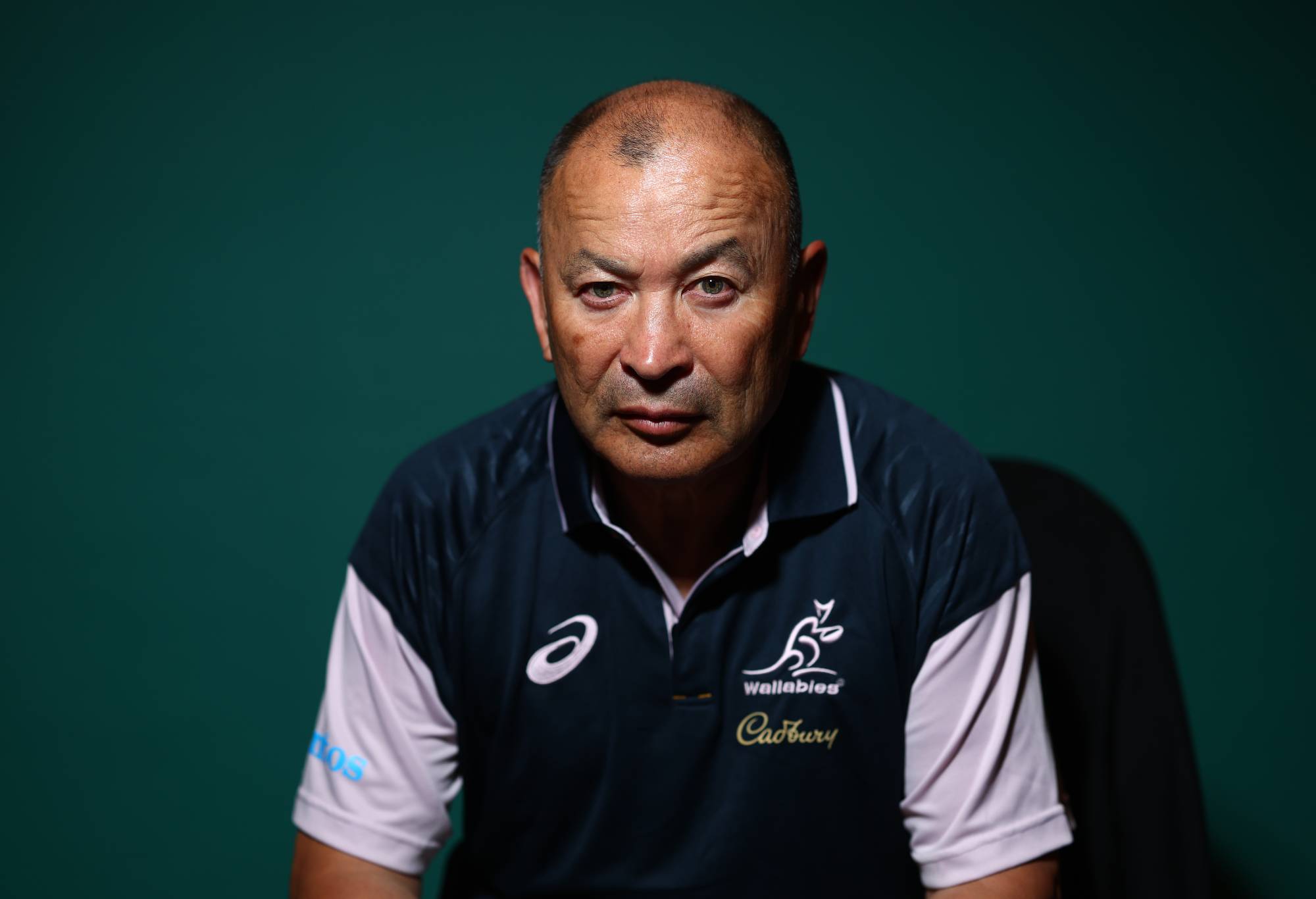
Head coach Eddie Jones has thrown out the rulebook for this year’s World Cup. (Photo by Chris Hyde/Getty Images)
Nor has Jones’ “bold” selections been restricted to the men gracing the field, with the experienced World Cup campaigner’s coaching staff one of the most eclectic and unusual teams brought together.
Indeed, former halfback and analyst Pierre-Henry Broncan is the side’s maul coach; recognised scrum coach Dan Palmer is taking care of the lineout; first-year rugby coach Brett Hodgson is the side’s defence assistant; the new attack coach Jason Ryles is another former league player, who previously worked with Jones for a matter of months with England and is about to join the Melbourne Storm.
These are appointments that break convention.
Compare Jones’ staff with Andy Farrell’s experienced team or Rassie Erasmus’, Fabian Galthie’s or Ian Foster’s, and it quickly becomes a chalk-and-cheese exercise.
Only Steve Borthwick’s staff is as inexperienced. But England isn’t a team one wants to be compared with at present.
The huge difference between Jones’ to Borthwick’s is the Australian is about to go to his fourth World Cup campaign as a head coach.
Borthwick, on the other hand, is a first-year international coach with only a little more than a year’s worth of experience as a club head coach.
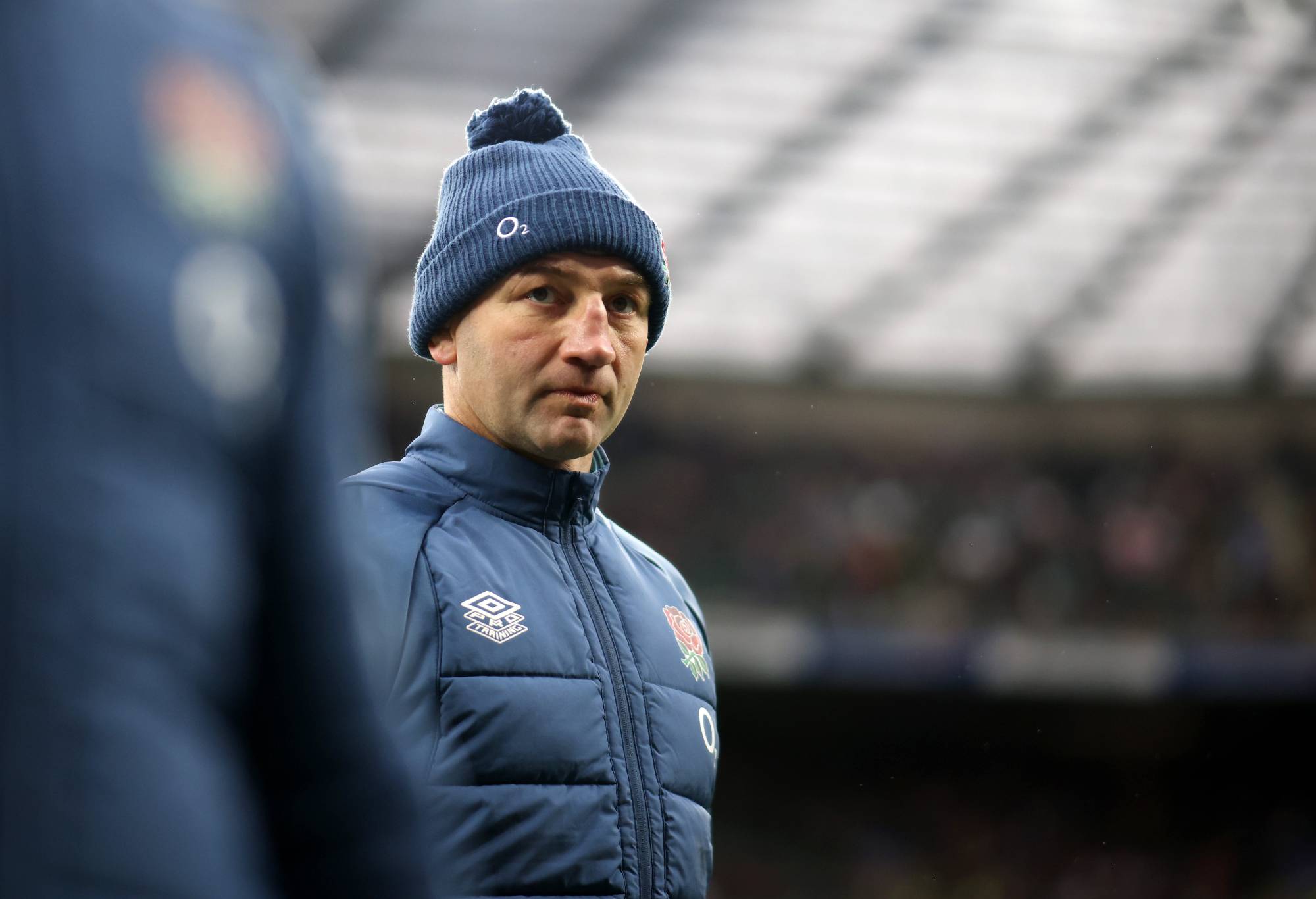
Only Steve Borthwick’s English side will head into the World Cup with more concern than the Wallabies. (Photo by Paul Harding/Getty Images
While he’s an experienced, proven assistant coach, the head coaching role is vastly different from the one that Borthwick succeeded in.
Nor does that consider the fact a club coach works directly with their teams for anywhere between six to 10 months depending on where you’re based. Compare that to the fly-in, fly-out role that international coaches have with their nation squads.
All along Jones has been adamant that the Wallabies’ World Cup is different.
“We’ve got a bit of a smash and grab job so we need people who can do a smash and grab job. It’s nine and a half months and there’s a beautiful jewellery store around the corner,” Jones said in February.
“We’ve got to get four or five coaches that can work together to get in there, steal the trophy and get out without getting caught.”
Then, having confirmed his coaching staff in May before losing attack coach Brad Davis on the eve of the World Cup, Jones continued.
“We believe we have a quality coaching staff to plan and prepare the team for a smash and grab campaign, winning the Bledisloe Cup and finishing by winning the Rugby World Cup,” he said.
“It is experienced, diverse and adaptable.”
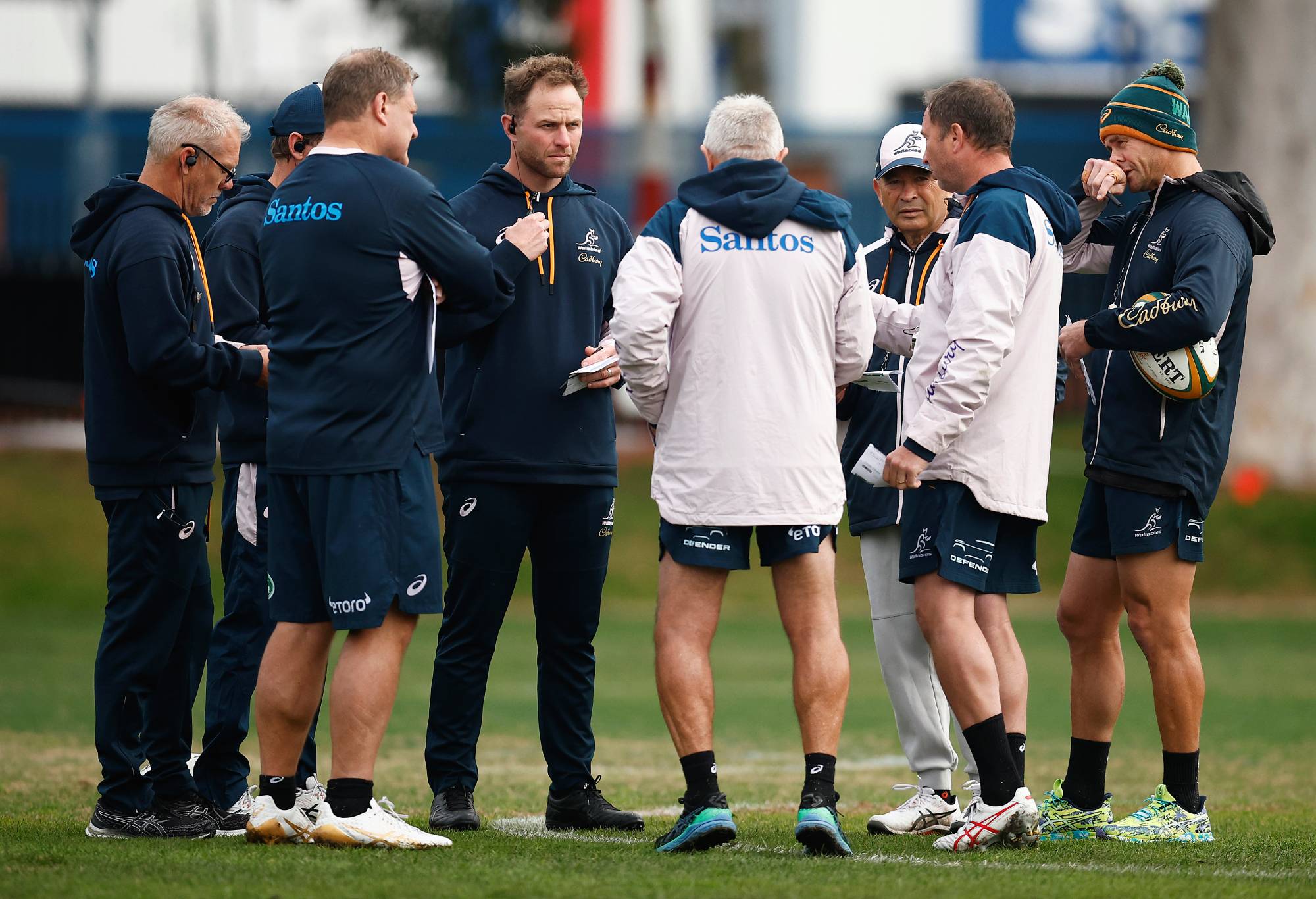
Wallabies head coach Eddie Jones (3#) chats with his coaching team during an Australia Wallabies training session at Brighton Grammar School on July 25, 2023 in Melbourne, Australia. (Photo by Daniel Pockett/Getty Images)
Thus far, the results have failed to fill anyone with confidence with the Wallabies to head into their World Cup opener against Georgia winless from five Tests.
Jones admits it’s far from ideal, but publicly remains far from forlorn.
“Within the camp, we’ve got a fair bit of confidence,” he told reporters following the Wallabies’ heavy loss to France on Sunday in their final match before the World Cup.
“Obviously we’d like to have a better win/loss record but we’ve re-established the team. We’ve taken away all the leadership that was there previously. We’ve got a new leadership team in place. We’re trying to play a different way.
“The results haven’t been good. It hasn’t been good enough. I’m not hiding away from that, but we do have a longer-term plan in terms of the World Cup and that’s what we’re here for.”
Jones is right, RA is looking at both the campaign around the corner and beyond the horizon at the Wallabies’ two feature events against the Lions in 2025 and their home World Cup in 2027, too.
Some of his ruthless selections have been made with the two campaigns just beyond the horizon in mind.
Yet, Jones won’t have accepted the job simply to roll over and wave the white flag.
Despite their dire results, albeit against three or the top four nations in the world, the Wallabies have shown glimpses of what they are capable of over the past month.
They failed to take their chances against the All Blacks in both Bledisloe Tests.
Ditto in Paris, where they missed several chances to apply scoreboard pressure.
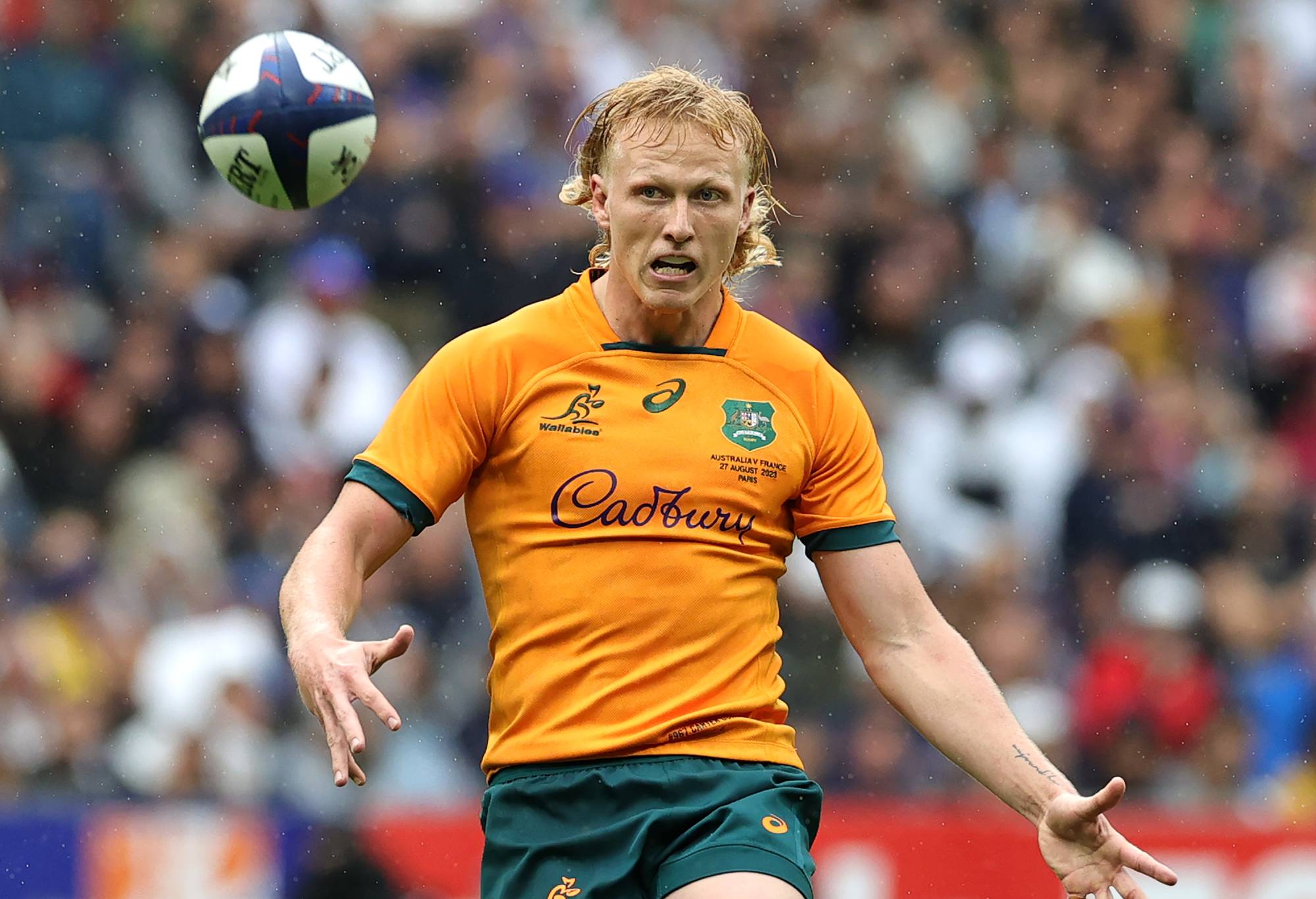
Carter Gordon’s kicking inexperience was exposed at Stade de France on August 27, 2023 in Paris. (Photo by David Rogers/Getty Images)
That was in part because of the 10 points Gordon left out on the Stade de France, including two first half penalties, but also because their inability to seize the moment early in the second half.
As 1999 World Cup winner Matthew Burke said, Test rugby is all about pressure.
“There’s a fascination now with kicking to the corner and putting a driving [maul] over. But Test rugby is not Super Rugby and you’ve got to kick your goals,” he told The Roar.
“I don’t care how you get there, you’ve just got to get the ‘W’ on the board.
“You’re right, the lessons learned of yesteryear always come back in vogue. You’re not trying to reinvent the wheel, some things still apply. When you look through history, and the great teams that have won, I’m sure there’s a piece of history or captaincy that runs throughout.”
Jones, too, recognises the importance of kicking. Yet, he is remaining behind Gordon.
“Yeah, nah, 100 per cent,” said Jones in response to the goal-kicking issues plaguing the current Wallabies side.
“But all we can do is work with the young kid. We’ve got young kids in this team. We’re backing them and he’ll [Gordon] get better.”
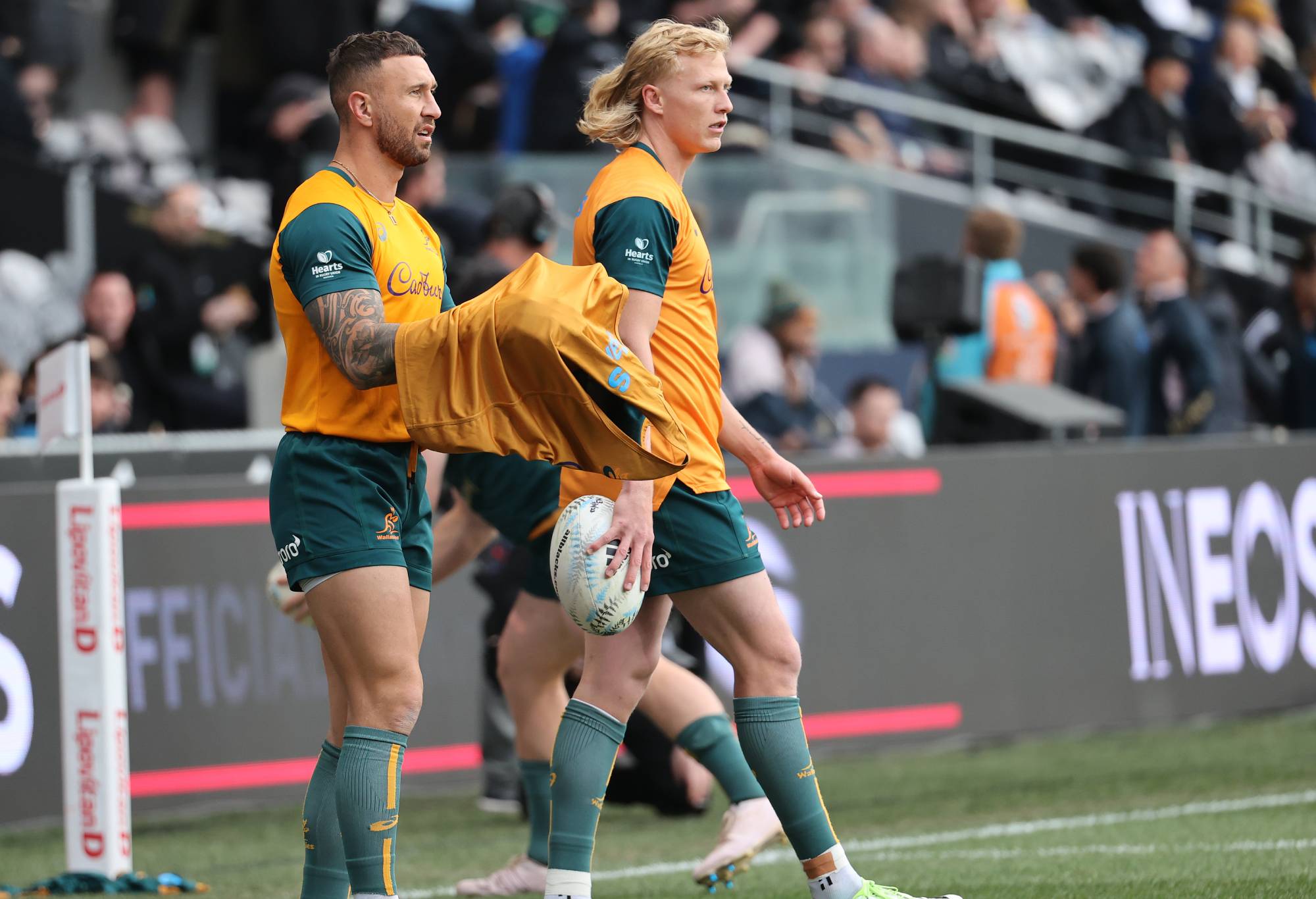
Carter Gordon (R) was preferred ahead of Quade Cooper for the Wallabies’ World Cup campaign. (Photo by Peter Meecham/Getty Images)
Gordon’s club assistant coach Tim Sampson is backing the rising No.10 to find his groove.
“We have a competition with our goal-kickers in the pre-season and like the Masters golf has a green jacket for the winner, the lads went out a bought a blue blazer from the op-shop and have a weekly competition and whoever got the highest percentage would take the blazer home and Carter kicked very well and got to wear the jacket,” Sampson told AAP.
“He struck them well against France and they were only just shaving the uprights but they were important in terms of scoreboard pressure.
“He works extremely hard and I’m sure he will be doing that.”
Burke, meanwhile, said he believed Gordon’s kicking technique could stand up.
“It’s Dave Alred (Burke’s and Jonny Wilkinson’s kicking coach) through and through, it’s Wilkinson-esque, and he hits it really well, he hits it really straight,” Burke said.
“He is our number one kicker and he obviously will be, so I just hope he gets the rest of his kicking game, he was a bit nervous in Melbourne, I hope he gets the rest of his kicking game going to allow him to play and ease into games.”
But like Gordon lining up for a shot at goals, there’s a huge element of the unknown heading into the Wallabies’ World Cup campaign.
It’s because Jones has broken convention.
Did he have to? No.
Did he need to? The past eight years suggest perhaps, even despite Rennie’s side pushing France last October (it was their first Test in months and the Wallabies had played 10 Tests in four months) and a Johnny Sexton-less Irish side in Dublin in November.
Whether or not his high-risk play pays off will be known quickly.

































































































